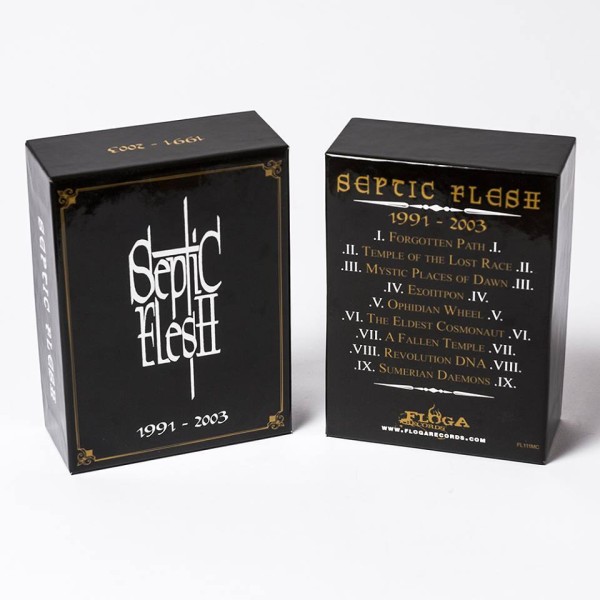Floga Records is releasing a box set of Septic Flesh’s first era in cassette format. While this box-set is limited to 300 copies and the format is somewhat obscure, much of the content included is of high quality, as Septic Flesh’s early discography is one of the high points of Greek underground metal, measuring up to such luminaries as Rotting Christ, Varathron, and Necromantia.
Septic Flesh began their career playing rough death metal, but even on their earliest demo (Forgotten Path) showed signs of the melodic, atmospheric sound that would become their signature. The abrasive death metal elements would remain for some years, but the band’s heavy keyboard presence, an emphasis on consonant guitar leads, and elaborate compositions make for a a more contemplative experience than, for instance, the generally more aggressive American metal acts. Septic Flesh’s first full-lengths admittedly suffer from flaws in their production that detract from the possible intensity they could reach (like the use of a weak drum machine), but they still capitalize on the band’s ability to create ethereal soundscapes in the context of metal. Mystic Places of Dawn and Esoptron in particular are masterpieces of this style, effortlessly integrating this into the admittedly declining quantities of death metal that this era showcases.
Later albums in this collection showcase the band reaching simultaneously towards higher heights of orchestration and problematically trying to secure some gothic metal money. This niche became enormously popular in the mid-90s despite being so wide as to encompass similar acreage of musical ground. Septic Flesh never discarded their ability to write melodic hooks, but after 1995, they were quick to simplify their style and write more accessible, less cavernous songs. These changes become strikingly obvious on Revolution DNA, which trades in the mythological and occult themes of previous works for sleek, shining futurism. That the band manages to retain their melodic prowess makes it serve as a functional and adequate work of pop music, but it is truly a low point of the compilation. The band’s previous overtures towards the mainstream (primarily in the form of operatic vocalists) were spun off into their own project (Chaostar), and Septic Flesh was arguably sundered. In recent years, partially represented on this compilation’s finale, Sumerian Daemons, the band has embraced the great simplification of their past, albeit overlaid and decorated with modern metal technique and an orchestral presence, creating music that in its strengths resembles that of mainstream film music filtered through the extreme metal mold. The new Septic Flesh is a much louder and brutish beast, separated from the atmospheric voice it was born with, but hints of the past permeate even the band’s latest releases to give it strength in its darkest hours.
1991-2003 is excellent as a historical archive and a collector’s item, at least for those few who value compact cassettes. It is probably entirely useless outside that niche, although it’s always possible that a similar box set may come out in a more accessible format. In addition, like other comprehensive box sets, it comes with its share of chaff and filler. Individual albums by Septic Flesh should not be too difficult to find, though, and some of them have even been reissued with new artwork and bonus rarities. The early full lengths are certainly worth the listener’s time.
Tags: 2015, compact cassette, compilation, death metal, rerelease, septic flesh



Communion was the only post-reunion album I found myself able to enjoy. All three are indeed more poppy and streamlined, but it at least was able to integrate the orchestral/symphonic elements – however simplified – smoothly into the songwriting, and I’m rather fond of Sotiris’ clean vocals. With The Great Mass and especially Titan, they’re constantly relying on the whole “metal – sound drops out – solo-orchestral section – metal comes back in” progression abused by so many orchestral metal bands these days, and it almost invariably sounds disjointed and lazy.
These guys were a joke when I saw them live with Deicide, but I do enjoy everything up through Sumerian Demons quite a bit (excepting, of course, Revolution DNA).
They were in rubber suits like Godzilla and barely played. The bassist/frontman strapped the bass to his back to pump up the crowd and the bassline continued. I was laughing my ass off and the guitarist was glaring at me.
I think their guitarist played in the late 80s band Energetic Krusher, a hybrid speed metal and death metal band:
https://www.youtube.com/watch?v=U1hUUhRAkTY